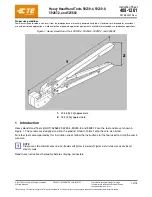
English
English
3
2
1) PERSONAL SAFETY
a ) Stay alert, watch what you are doing and use
common sense when operating any tool. Do
not use any tool while you are tired or under
the influence of drugs, alcohol or medication.
A moment of inattention while using any tool may
result in serious injury.
b ) Use safety equipment.
Always wear eye protection.
Safety equipment such as dust mask, non-skid
safety shoes, hard hat, or hearing protection used for
appropriate conditions will reduce personal injuries.
c ) Do not overreach.
Keep proper footing and balance
at all the times. This enables better control of any tool
use in unexpected situations.
d ) Dress properly.
Do not wear loose clothing or
jewelry. Keep hair, clothing and gloves away from
moving parts. Loose clothes, jewelry or long hair
WARNING:
When using tool lanyards and
accessories, basic precautions should always be
followed, including the following:
DANGER:
Tool lanyards must never be used for Fall Protection of any kind.
DANGER:
Crush, cut or entanglement hazard. Do no use near moving parts, mechanisms
or running machinery.
WARNING:
Do not use with power tools.
Keep out of the reach of children.
can be caught in moving parts. Air vents often cover
moving parts and should also be avoided.
e ) Do not attach lanyard around your wrist or to a
pant belt loop.
f ) Make sure the carabiner lock
(or cinch cord lock) is
engaged and properly secure prior to use.
g ) Inspect
before each use as instructed in this manual.
h ) Do not alter or use
in a manner other than as
instructed in this manual.
i ) Only attach metal D-ring to a lanyard carabiner
or cinch cord end. Do not attach by looping or
knotting the lanyard. Do not attach lanyard
directly to the sleeve or tape measure.
j ) Dropped tools
will swing on the tool lanyard, which
could cause injury or loss of balance.
k ) Only transfer the tool to and from your wrist while
the tool is secured in a pouch and you are properly
balanced in a stable orientation.
l ) Do not attach lanyards to tool in a way that keeps
guards, switches or lock-offs from operating
properly.
2) WORK AREA SAFETY
a ) Keep work area clean and well lit. Cluttered or dark
areas invite accidents.
b ) Keep children and bystanders away while
working. Distractions can cause you to lose control.
c ) Very often, the consequences of a falling
object are underestimated: dropping a work tool
also means the risk of destroying the tool, and the
possible damage of property can also have serious
consequences in terms of costs, as well as the lost time
required by the worker to leave their work station to
recover the tool. The D
E
WALT range of tool lanyards
are the perfect solution for the drop prevention of tools
while working at height.
d ) Do not use tool lanyard to get additional leverage
from the tool.
e ) Do not carry objects by the tool lanyard.
f ) Keep away from chemicals (especially strong acids,
bases and oxidizing agents).
g ) Do not use with power tools.
h ) Do not extend length of tool lanyard with another
tool lanyard, string or rope, etc.
i ) Electrical shock hazard. Be sure power is off when
working in high voltage areas. Some components of
the tool tethering system are conductive.
3) GENERAL SAFETY
a ) After falling 20 feet/6 meters, a 2.2 lb/1kg hammer can
strike with a force of up to 130lb/59 kg.
b ) Never modify or alter the product.
c ) Be extra careful while using this product around moving
machinery.
d ) Never tie a knot in the tool lanyard (including its sub
systems).
e ) Tool lanyards or similar products are never to be used as
Personal Protective Equipment (PPE). Never use any tool
lanyards or their subcomponents beyond their individual
capacity rating.
f ) Always ensure that proper distance is maintained to prevent
a dropped tool from striking other objects during its arrest.
g ) Always select the tool attachment product or lanyard based
on its rating shown in the TECHNICAL SPECIFICATION
TABLE (see on page 6).
h ) The use of this tool-holding lanyard (that are not PPE),
does not exempt you from the obligation of wearing PPE,
especially a safety helmet, goggles and gloves.
i ) Some tools do not come with a hole on their handle where
a lanyard may be attached.
D
E
WALT
provides various tool
attachments, that are not an integral part of a tool, but are
an ideal solution to act as a secure connection point for a
tool lanyard.
j ) These products are best suited for use in confined spaces
or when working with tools on platforms or scaffolds. Store
Lanyards away from tools and other objects that may
damage them. Never modify tools to create attachment
points.




































